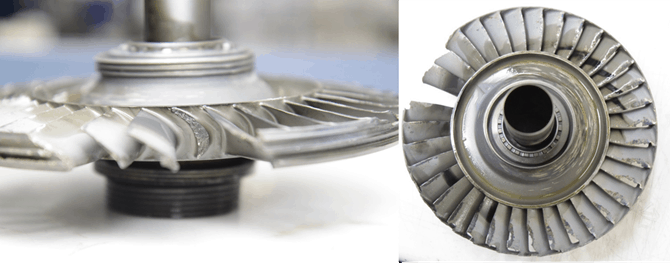Rapid-Spreading Fatigue Crack in Turbine Blade Causes Helicopter Engine Failure

The incident occurred as a helicopter was completing an air-taxi from a hangar to a maintenance facility at Sydney’s Bankstown Airport
• • •
Onboard were the pilot and one passenger. The helicopter was a twin-engined Airbus Helicopters AS355F-1 helicopter, registered VH-SEV.
As the skids touched the ground on landing, the pilot heard a loud ‘squeak’ from the helicopter’s right-hand side. The pilot scanned the instrument panel and observed the engine gas generator speed (Ng) drop to 55 percent and the right-hand engine chip light illuminate. A few seconds later, the pilot observed smoke coming from that side of the aircraft and immediately shut down the right-hand engine.
Mechanics from a nearby workshop quickly extinguished the engine fire. There was substantial damage to the engine and minor heat damage to the surrounding structure of the helicopter.
The Australian Transport Safety Bureau (ATSB) investigation found that the single third-stage turbine wheel blade failed due to fatigue cracking, resulting in secondary damage to the engine, and total engine failure
“Any pilot, regardless of their level of experience, can find themselves confronted with an unexpected failure,” said ATSB Director Transport Safety Stuart Macleod. “The pilot’s quick response to the unexpected failure helped ensure the best possible safety outcome.”
“This incident reinforces that it is important for pilots to monitor aircraft performance parameters continuously for abnormal indications,” said Mr. Macleod.
Engine manufacturer Rolls-Royce advised the ATSB that, with the Rolls-Royce 250 enhanced power turbine engine, a dwell of just a few seconds can be enough to initiate damage and propagate a crack to failure.
In response, Rolls-Royce is redesigning the third-stage turbine wheel to improve its tolerance to fatigue cracking and operation at responsive wheel modes.
The ATSB report AO-2018-021 provides important advice for operators of aircraft with Rolls-Royce 250 enhanced power turbine engines.
Founded in 1988, the TapRooT® Root Cause Analysis System solves hurdles every investigator faces
TapRooT® Root Cause Analysis Training System takes an investigator beyond his or her knowledge to think outside the box. Backed with extensive research in human performance, incident investigation, and root cause analysis, TapRooT® is a global leader in improved investigation effectiveness and productivity, stopping finger-pointing and blame, improving equipment reliability, and fixing operating problems.

System Improvements, the creator of the TapRooT® System, has a team of investigators and instructors with years of extensive training ready to offer assistance worldwide. We also offer ongoing support to our clients through free newsletters and root cause tip videos, the root cause analysis blog, and our annual Global TapRooT® Summit.
NOTE: Because of current corporate and governmental travel restrictions, social distancing policies, governmental regulations, and overall concern of the virus, we are CANCELLING all courses in North America through the end of May, and some into the early summer months. We hope this will allow enough time for the virus to subside and our clients to recover.
Of course, our staff and technical support team are working during this time. Feel free to connect by phone (MAIN: 865.539.2139; SUPPORT: 865.357.0080) or EMAIL.
We look forward to teaching COURSES as soon as possible. In the meantime, we also offer ongoing support to our clients through free NEWSLETTERS, root cause tip VIDEOS, and the Root Cause Analysis BLOG on our WEBSITE.
Please see our Covid-19 full STATEMENT.
TapRooT® Root Cause Analysis Training courses are taught all over the world. If you are interested in learning how to stop repeat incidents, find a 2-DAY or 5-DAY course. We are available to train you and your staff on-site at your workplace; CONTACT US to discuss your needs. You may also call us at 865.539.2139 to discuss any questions you may have.
Keep in Touch to Improve Your Problem-Solving Skills
We’re continually training, helping you improve your professional root cause analysis skills. Stay current with your TapRooT® Root Cause Analysis skills and training by:
- Following our blog;
- Tuning in to TapRooT® TV Video Sessions or our podcasts;
- Connecting with us on Facebook, Twitter, Instagram, Pinterest, LinkedIn, and YouTube.



